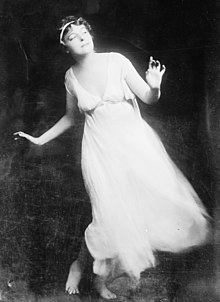Florence Fleming Noyes
Florence Fleming Noyes | |
|---|---|
 Florence Fleming Noyes, from about 1913 | |
| Born | 1871 Sharon, Massachusetts, U.S. |
| Died | February 4, 1928 New York, New York, U.S. |
| Occupation(s) | Dancer, dance educator |
Florence Fleming Noyes (1871– February 4, 1928) was an American modern dancer and dance educator. She founded schools and camps to teach dancers according to her own philosophy of movement. known as the Noyes Rhythm movement system.
Early life and education[edit]
Noyes was from Sharon, Massachusetts, near Boston,[1] and studied with Charles Wesley Emerson and Lucia Gale Barber.[2]
Career[edit]
In 1912 Noyes opened her first dance studio in Carnegie Hall, teaching her own version of rhythmic dance,[2][3] which she eventually developed into the "Noyes Rhythm" movement system.[4] "With the discovery of a sense of rhythm, pupils find the doors of artistic expression open to them and forms of beauty in color, music, sculture, dance, in the written and spoken word, are the result," she explained in a 1925 interview.[5] Much like the students of Isadora Duncan or Ruth St. Denis, Noyes' dancers wore Greek-inspired flowing silk gowns, and they dance barefoot or in sandals, both choices meant to enhance and communicate the dancer's freedom.[6][7]

Noyes danced in Paris at a 1912 conference about Rodin.[2] In 1913 she dressed as Liberty at the Capitol in Washington, D.C. as part of a tableau vivant to bring publicity for the cause of women's suffrage.[8][9] In 1921 she founded two dance camps in Portland, Connecticut,[10] the Shepherd's Nine for women, and the Junio.[11] Whole families came to her camps in Connecticut as a summer escape.[12]
Publications[edit]
- The Psychology of the New Education (1923, with Wolstan Crocker Brown)[13]
- Rhythm: The Basis of Art and Education (1923, with Wolstan Crocker Brown)[14]
Personal life and legacy[edit]
Noyes died in 1928, in New York City.[7][15] The Noyes School of Rhythm in New York continued offering dance classes until 2002.[11] Similarly, the Noyes Rhythm Camp in Cobalt, Connecticut, continued long past Noyes's lifetime.[16] The Noyes Rhythm movement system is still taught at summer programs and in classes.[17] Among her students were actress Edith Wynne Matthison,[1] actor Richard Bennett,[1] dancer Grace Christie,[15] and dancer and dance educator Valeria Gibson Ladd.[18]
References[edit]
- ^ a b c "Inauguration Pageant; About Florence Fleming Noyes". New-York Tribune. 1913-03-02. p. 64. Retrieved 2024-05-05 – via Newspapers.com.
- ^ a b c Rainey, Ada (July 1913). "The New Constructive Dancing". Good Housekeeping. 57: 29–31.
- ^ "Another New Art of the Theatre". Theatre Magazine. 17: 90–91. March 1913.
- ^ "Noyes-Rhythm Class Begins This Morning". The Ridgewood Herald. 1928-11-07. p. 18. Retrieved 2024-05-05 – via Newspapers.com.
- ^ Espenscheid, Thyra (1925-09-20). "Should We Be Ourselves, or Act like Manikins?". The Brooklyn Daily Eagle. p. 95. Retrieved 2024-05-05 – via Newspapers.com.
- ^ Knoblauch, A. Abby; Moeller, Marie E. (2022-07-15). Bodies of Knowledge: Embodied Rhetorics in Theory and Practice. University Press of Colorado. p. 112. ISBN 978-1-64642-201-2.
- ^ a b Zucker, Gale (August 24, 1997). "Noyes and Duncan, The Freedom of Dance". The New York Times. p. 101. Retrieved 2024-05-05 – via TimesMachine.
- ^ Simonson, Mary (2013). Body Knowledge: Performance, Intermediality, and American Entertainment at the Turn of the Twentieth Century. Oxford University Press. pp. 62–63. ISBN 978-0-19-989801-5.
- ^ "No Flimsy, Flowing Robes in Coming Washington Tableaux". The New York Times. February 7, 1913. Retrieved 2008-12-12.
- ^ Thompson, Nancy (August 8, 1995). "Dancers Tap". Hartford Courant. Retrieved 2008-12-12.
- ^ a b "The Noyes School of Rhythm". The Noyes School of Rhythm. Archived from the original on May 14, 2008. Retrieved 2008-12-20.
- ^ "Cincinnati Group Goes to Cobalt". The Kentucky Post. 1927-06-27. p. 16. Retrieved 2024-05-05 – via Newspapers.com.
- ^ Brown, Wolstan Crocker (1923). The Psychology of the New Education. Noyes-group association.
- ^ Noyes, Florence Fleming; Brown, Wolston Crocker (1923). Rhythm: The Basis of Art and Education. Noyes-group association.
- ^ a b "The Dance: Lost Russians – Stars of the Old Ballets Now Living in the United States Would Make a Significant Company". The New York Times. February 12, 1928. p. 6X. Retrieved 2008-12-20.
- ^ Brooker, Meg (January 2008). "Saturday Night at Noyes Rhythm Camp". Congress on Research in Dance Conference Proceedings. 40 (S1): 20–27. doi:10.1017/S2049125500000467. ISSN 2049-1255.
- ^ "Noyes School of Rhythm – Rhythm for Life". Retrieved 2024-05-05.
- ^ "Valeria Ladd collection on the revived Greek dance, 1924-1967". Library of Congress. Retrieved 2024-05-05.
